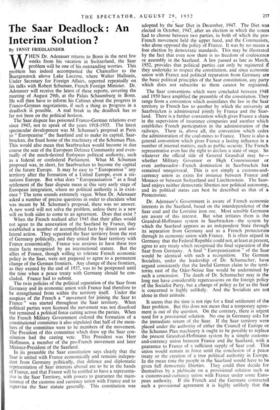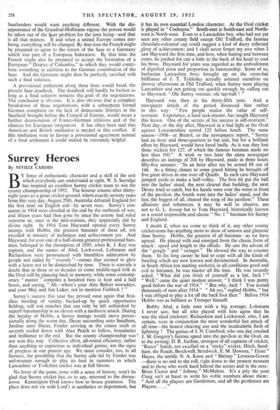The Saar Deadlock : An Interim Solution ?
By ERNST FRIEDLAENDER
WHEN Dr. Adenauer returns to Bonn in the next few weeks from his vacation in Switzerland, the Saar problem will be one of his outstanding worries. This problem has indeed accompanied the Chancellor to the Buergenstock above Lake Lucerne, where Walter Hallstein, Under Secretary for Foreign Affairs, reported repeatedly on his talks with Robert Schuman, French Foreign Minister. Dr. Adenauer will receive the latest of these reports, covering the meeting of August 29th, at the Palais Schaumburg in Bonn. He will then have to inform his Cabinet about the progress in Franco-German negotiations, if such a thing as progress in a deadlock is possible. A real break in the deadlock has so far not been on the political horizon.
The Saar dispute has poisoned Franco-German relations ever since 1945, not to speak of the years 1918-1935. The latest spectacular development was M. Schuman's proposal at Paris to " Europeanise " the Saarland and to make its capital, Saar- brucken, the fixed home of the machinery of the Schuman Plan.
This would also mean that Saarbrucken would become in due course the seat of the European Defence Community and even- tually of the much-desired adopean political authority, such as a federal or confederal Parliament. What M. Schuman proposed was, in short, for Saarbrucken to become the capital of the future Europe. It may be easy to " Europeanise " any territory after the formation of a United Europe, even a six- nations Europe. But what does " Europeanisation " as a final settlement of the Saar dispute mean at. this very early stage of European integration, where no political authority is in exist- ence ? The term sounds extremely vague. When Dr. Adenauer asked a number of precise questions in order to elucidate what was meant by M. Schuman's proposal, there was no answer. A new word will not solve the problem, unless there is a new will on both sides to come to an agreement. Does that exist ?
When the French realised after 1945 that their allies would not agree to the annexation of the Saarland by France, they established a number of accomplished facts by direct and uni- lateral action. They separated the Saar territory from the rest of Germany politically, and they united the Saar territory with France economically. France was anxious to have these two main facts recognised by an international statute. But the allies of France, though willing to tolerate French economic policy in the Saar, were not prepared to agree to a permanent change of the German frontiers. Any change of these frontiers, as they existed by the end of 1937, was to be postponed until the time when a peace treaty with Germany should be con- cluded. France had to submit.
The twin policies of the political separation of the Saar from Germany and its economic union with France had therefore to be strengthened from within the territory itself. Under the auspices of the French a " movement for joining the Saar to France " was started throughout the Saar territory. When political parties were licensed the movement was not dissolved but remained a political force cutting across the parties. When the French Military Government ordered the formation of a constitutional committee it also stipulated that half of the mem- bers of the committee were to be members of the movement. The President of this committee which drew up the Saar con- stitution had the casting vote. This President was Herr Hoffmann, .a member of the pro-French movement and later Minister-President of the Saarland.
In its preamble the Saar constitution says clearly that the Saar is united with France economically and remains indepen- dent from Germany politically, that defence and diplomatic representation of Saar interests abroad are to be in the hands of France, and that France will be entitled to have a representa- tive in the Saar Territory, with powers to guarantee the main- tenance of the customs and currency union with France and to supervise the Saar statute generally. This constitution was adopted by the Saar Diet in December, 1947. The Diet was elected in October, 1947, after an election in which the voters had to choose between two parties, in both of which the pro- French movement held the upper hand, and the Communists, who alone opposed the policy of France. It was by no means a free elettion by democratic standards. This may be illustrated by the fact that even now there is no freedom of coalescence or assembly in the Saarland. A law passed as late as March. 1952, provides that political parties can only be registered if they undertake to respect the constitution, and since economic union with France and political reparation from Germany are the basic political principles of the Saar constitution, any party which does not subscribe to them cannot be registered.
The Saar conventions which were concluded between 1948 and 1950 have amplified the preamble of the constitution. They range from a convention which assimilates the law in the Saar territory to French law to another by which the university at Saarbrucken is administered jointly by France and the Saar- land. There is a further convention which gives France a share in the supervision of insurance companies and another which establishes French participation in the administration of the railways. There is, above all, the convention which cedes the administration of the coal-mines to France. There is also a general convention which gives France a lasting influence in a number of internal matters, such as public security. The French representative even has the right to declare a state of siege. So whatever the official title of General Grandval may be— whether Military Governor or High Commissioner or even ambassador—French domination in Saarbrucken has remained unequivocal. This is not simply a customs-and- currency union as exists for instance between France and Monaco or between Switzerland and Liechtenstein. The Saar- land enjoys neither democratic liberties nor political autonomy, and its political status can best be described as that of a Protectorate.
Dr. Adenauer's Government is aware of French economic interests in the Saarland, based on the interdependence of the Saar coal and the Lorraine iron ore. Most sensible Germans are aware of this interest. But what irritates them is the Grandval-Hoffmann system in Saarbrucken—the system by which the Saarland appears as an independent State through its separation from Germany and as a French protectorate through its economic union with France. It is often argued in Germany that the Federal Republic could not, at least at present, agree to any treaty which recognised the final separation of the Saar from Germany. A final " Europeanisation " of the Saar would be identical with such a recognition. The German Socialists, under the leadership of Dr. Schumacher, have argued consistently that the lawful German claim to the terri- tories east of the Oder-Neisse line would be undermined by such a concession. The death of Dr. Schumacher may in the long run have considerable repercussions on the foreign policy of the Socialist Party, but a change of policy as far as the Saar is concerned is highly unlikely. And the Socialists are not alone in their attitude.
It seems that the time is not ripe for a final settlement of the Saar problem. But this does not mean that a temporary agree- ment is out of the question. On the contrary, there is urgent need for a provisional solution. No one in Germany asks for the immediate return of the Saar. If the Saar territory were placed under the authority of either the Council of Europe or the Schuman Plan machinery it ought to be possible to replace the present Grandval-Hoffmann system by a simple customs- and-currency union between France and the Saarland, with a guarantee to France of a sufficient supply of Saar coal. This union would remain in force until the conclusion of a peace treaty or the creation of a true political authority in Europe. In the mean time the people in the Saarland would have to be given full democratic liberties. They could then decide for themselves by a plebiscite on a provisional solution such as a customs-and-currency union with France under some Euro- pean authority. If the French and the Germans contracted such a provisional agreement it is highly unlikely that the Saarlanders would want anything different. With the dis- appearance of the Grandval-Hoffmann regime the poison would be taken out of the Saar problem for the time being—and that is all that matters. If and when a united Europe comes into being, everything will be changed. By that time the French might be prepared to agree to the return of the Saar to a Germany which was part of a European federation. By that time the French might also be prepared to accept the formation of a European " District of Columbia," to which they would contri- bute something in addition to the German contribution of the Saar. And the Germans might then be perfectly satisfied with such a final solution.
A provisional settlement along these lines would break the present Saar deadlock. The deadlock will hardly be broken as long as a final solution remains the., goal of the negotiations. The conclusion is obvious. It is also obvious that a complete breakdown of these negotiations, with a subsequent formal German complaint on the lack of democratic liberties in the Saarland brought before the Council of Europe, would mean a further deterioration of Franco-German relations and of the chances for European integration. It has often been said that American and British mediation is needed in this conflict. If this mediation were to favour a provisional agreement instead of a final settlement it could indeed be extremely helpful.



































 Previous page
Previous page